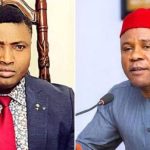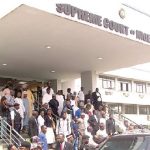Ebonyi State Governor, David Umahi has named the state International Airport in Onueke after President Muhammadu Buhari.

The Senor Special Assistant to Governor Davido Umahi on Aviation and Technology, Mrs. Obianuju Alo disclosed this on Wednesday while addressing newsmen in Abakaliki.
According to her, Umahi has secured approval from the federal government to inaugurate flight operations at the Onueke International Airport which was named after Buhari.
Alo said that the inauguration would boost economic activities in the state and create more means of employment for the people, especially at the location of the Airport.
She said: “We are going to have two flights landing on the airport, one from Abuja and another from Lagos. And subsequently, two flights will be landing every week, coming from Abuja and Lagos. What it means, is that, with the Airport inauguration, Ebonyi state is open for business.
“We want to encourage all Ebonyians and investors to come to Ebonyi and do their business. Ebonyi will now start exporting agricultural products to the entire world.
“International airlines will soon be coming to Ebonyi state, and when they come, they would employ the people of the State and the local communities will benefit so much from it.”
Alo further noted that six persons per Local Government Area have been approved by the state government to be scheduled to board the test flight from Abuja and Lagos as the costs for the tickets will be shouldered by the State Government.
She emphasized that with the quality of the state-of-the-art facilities that adorn the International Airport, Ebonyi State is set to be one of the destinations of World travels and tourism that inspire global marketplace.
Alo expressed confidence that the incoming administration led by the Governor-elect, Francis Nwifuru will continue to build on the legacies and infrastructural development embarked upon by the David Umahi-led administration.
KanyiDaily recalls that Governor David Umahi said that the 2 Niger Bridge, Enugu International Airport, and other projects in the South-East, were Igbo’s rights and not favours.


![Female Fan Fondles D'banj's Private Part, Tries To Unbuckle His Trousers On Stage [Video] 2 Female Fan Fondles D'banj's Private Part, Tries To Unbuckle His Trousers On Stage [Video]](https://media.kanyidaily.com/2023/04/26090254/Dbanj-150x150.jpg)

![Portable Fights With Nigerian Man At Shopping Mall In Canada [Video] 5 Portable Fights With Nigerian Man At Shopping Mall In Canada [Video]](https://media.kanyidaily.com/2024/11/23120451/portable-150x150.jpg)

![VeryDarkMan Accuses Access Bank Of 'Stealing' Late Customer's Over N500 Million [Video] 9 VeryDarkMan Accuses Access Bank Of 'Stealing' Late Customer's Over N500 Million [Video]](https://media.kanyidaily.com/2024/11/23092706/VeryDarkMan-Access-Bank-150x150.jpg)


![Senator Ifeanyi Ubah Buried Amid Tears In Nnewi, Anambra [Photos] 15 Senator Ifeanyi Ubah Buried Amid Tears In Nnewi, Anambra [Photos]](https://media.kanyidaily.com/2024/11/22181108/Ifeanyi-Ubah-150x150.jpg)





